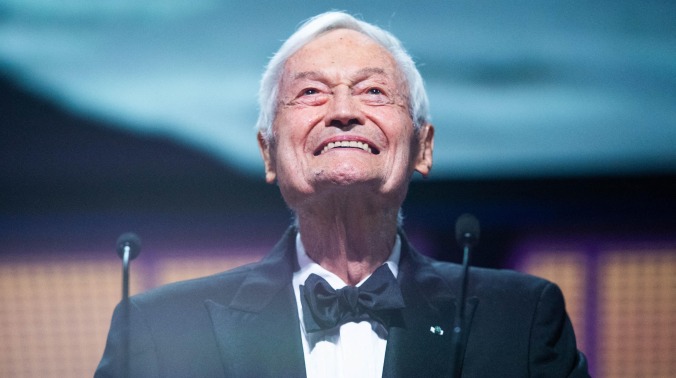R.I.P. Roger Corman, legendary B-movie filmmaker, producer, and Hollywood mentor
Roger Corman, director of The Little Shop Of Horrors and producer of over 400 films, died at age 98

Roger Corman, the iconic filmmaker and producer known for The Little Shop Of Horrors and Edgar Allan Poe adaptations like The Masque Of The Red Death, died last Thursday, according to weekend reports. In a statement, his family confirmed that Corman died in his Santa Monica home, per The Hollywood Reporter. He was 98 years old.
“He was generous, open-hearted and kind to all those who knew him,” Corman’s family said in their statement. “When asked how he would like to be remembered, he said, ‘I was a filmmaker, just that.’”
Corman began his career in the 1950s working at Fox, first as a bike messenger and later as “a story analyst in the story department, reading scripts and giving comments on them,” he explained to The A.V. Club in 2010. The role was “good preparation” for becoming a director and producer, though he ultimately spent the majority of his career working outside of the studio system. As he graduated to working on his own films, Corman became known as a master of B-movies and exploitation films, many of which “brought in certain commentary that was important to me,” he said when speaking to The A.V. Club again in 2022. He also became famous for his creative, guerrilla filmmaking; A Bucket Of Blood was shot in just five days, while Little Shop was shot “in two days and a night of exterior shooting. In his own estimation, his work “gained a great deal, both from an artful standpoint and a commercial standpoint by going into the streets” while “The studios were still primarily shooting in the studios.”
In 1970 he formed his own independent studio, New World Pictures, and was a prolific producer. New World made many a horror movie and monster flick, but Corman also used his position to distribute the works of international directors that hadn’t been given a chance in the U.S., including films from Ingmar Bergman, Federico Fellini, François Truffaut, Akira Kurosawa, and Werner Herzog. Corman had a legendary eye for talent, kickstarting the careers of actors like Jack Nicholson, Dennis Hopper, William Shatner, and Robert De Niro.
In particular, he was known for mentoring burgeoning filmmakers. Corman told The A.V. Club he looked for three things in up-and-coming talent: “intelligence, the ability to work hard, and the third, which is intangible, is creativity,” he said. His impressive list of protégés includes Peter Bogdanovich, Martin Scorsese, Francis Ford Coppola, Jonathan Demme, Gale Anne Hurd, Ron Howard, and James Cameron. “I didn’t know what big successes they’d become. I believed they were going to have successful careers,” he reflected. “But the number of Academy Award winning directors who started with me is just amazing. I wasn’t aware that they were going to go that big.”
“He gave you kind of a visual credo–the importance of imaginative editing and imaginative camerawork in order to keep the eye involved, because if you lose the viewer’s eye, you’re going to lose the viewer’s interest,” Demme recalled of Corman’s mentorship in a 2002 interview with The A.V. Club. “He also stressed the importance of having as many characters as possible that are in every way just as interesting as your main characters, even if they get less screen time. He had his tried-and-true formula for audience success, which was equal parts action, sex, and comedy, with a little bit of social commentary thrown in for good measure, preferably from the left side of the coin.”
Corman believed “motion pictures are the significant art form of our time,” he said in 2010. “And I think the main reason is, they’re an art form of movement, as opposed to static art forms of previous times. But another reason that they’re the preeminent art form is they’re part art and part business. They are a compromised art form, and we live in a somewhat compromised time. And I believe to be successful over the long run, unless you’re a Federico Fellini or an Ingmar Bergman or a true genius in filmmaking, you have to understand that you’re working in both an art and a business.” He reiterated as much in 2022, observing that the studio heads of old understood that which the CEOs of today don’t: “The studios are now run by businessmen and they’re only interested in the money. And their films are not doing so well because they fail to realize that it is both an art and a business.”
Corman had a long and fruitful career, producing over 400 films and ultimately receiving an honorary Oscar in 2009 at the Governors Awards. But he largely left off directing himself after turning his attention towards producing. “I was directing a picture called Von Richthofen And Brown in 1970, which was a World War I flying picture, and I just became tired. I had directed almost 60 pictures in 12 or 13 years,” he shared with The A.V. Club. “I remember we were shooting at a private airport outside of Dublin, and I would drive to the airport each morning, and I still remember a fork in the road: You went left to the airport, and there was a sign that said ‘Right To Galway Bay.’ Every morning, I thought ‘I just want to drive to Galway Bay and sit on the beach and look at the ocean.’”
“Each morning, dutifully, I drove to the airport and I did my job, but I knew that I was going to stop directing when I finished the picture,” he said. “I did finish the picture.”